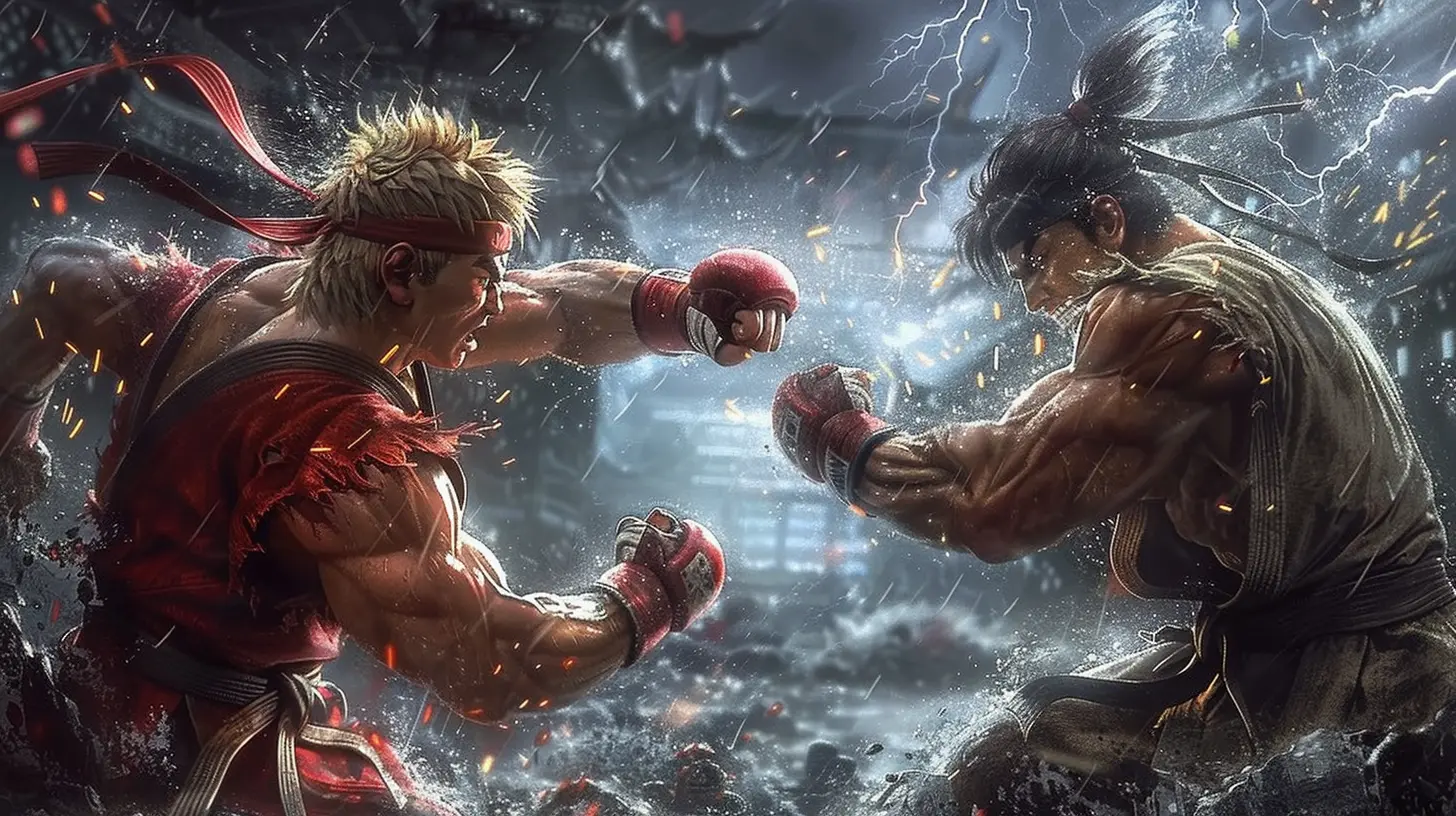30 November 2024
Fighting games, while flashy and adrenaline-pumping on the surface, are much more than just button mashing and fancy combos. Beneath all the fireballs, spinning kicks, and dramatic KO screens lies a nuanced battlefield of strategy, quick thinking, and — most importantly — adaptability.
Yup, adaptability. That’s the magic ingredient that separates casual players from true warriors of the arcade (or… online lobbies, because we’re not exactly lining up at cabinets anymore). But why is adaptability so crucial in fighting games? And how can you cultivate this skill to crush your opponents like a pro? Let’s dive deep into what makes adaptability the kingpin of fighting game success. 
Fighting Games: More Than Just Muscle Memory
Before we get into why adaptability matters, let’s talk about the nature of fighting games. Sure, there are other genres where you need skills, like RPGs where you grind levels or FPS games where aim is everything. But fighting games? They’re a different beast altogether.Fighting games throw you straight into a head-to-head duel, often with no room for error. Every match is a dance — except your dance partner is trying to knock you off the floor. The key to victory isn’t just knowing your character's moves; it's how you respond to the unexpected.
Got an opponent who blocks everything? You’ll need to mix up your attacks. Facing a button-mashing Ryu who won’t stop firing Hadoukens? You’ve got to think on your feet. Fighting games are living, breathing tests of your ability to adapt. 
Why Adaptability Determines Success
1. Different Opponents, Different Styles
No two players are the same. Sure, the character they pick has a set list of moves, but how they use those moves? That’s entirely up to them.Let’s say you’re playing Street Fighter and you’re up against a Ken player. The first Ken you fought might’ve gone all-in on Shoryukens, and you figured out how to punish it. But the next Ken? They could be all about zoning, keeping you away with kicks and fireballs.
Here’s the thing: if you stick to a rigid playstyle, you’ll get smoked. Adaptability lets you pivot. It’s like playing chess — you don’t keep using the same opening no matter what your opponent does. You feel them out, read their moves, and adjust your game plan on the fly.
2. Learning Mid-Match
This one’s huge. In fighting games, reading your opponent is a constant process. In the first round, you might be gathering data:- Do they block low a lot?
- Are they aggressive right off the bat?
- Do they panic when you’re up close?
Once you identify these patterns, you’ve got your edge. Flexibility is your best friend here. Can you imagine if you guessed wrong in the first round and just kept doing the same thing? That’s how you lose matches fast.
Adaptability means you’ve got the brainpower to switch strategies mid-match. It’s like having a Plan A, B, C, and even D ready to unleash depending on the situation.
3. Dealing with Meta and Tier Lists
If you’ve been in the fighting-game community for any amount of time, you’ve probably heard about the infamous "tier lists." These rank characters based on how strong they are, usually in the hands of top players.While tier lists are nice for debate (and online flame wars), relying on them rigidly isn’t going to get you very far. Why? Because the meta evolves. Constantly.
Maybe a character is considered low-tier at first, but then a crazy player discovers a new tech that boosts their viability. Or maybe an update/patch changes everything and “buffs” a character while nerfing others.
The point is, if you’re adaptable, you don’t freak out when the meta shifts. You experiment, learn, and adjust your playstyle to keep pace. Those who don’t? They’re stuck whining on forums.
4. Mind Games and Yomi
If you’ve never heard the term “yomi,” don’t worry — it’s basically a fancy word for reading your opponent’s mind. Fighting games are like a psychological war, where adaptability plays a huge role.For example, let’s say you’ve got an opponent who keeps blocking every one of your attacks. If you’re not adaptable, you’ll keep banging your head against that wall, losing over and over. But if you’re thinking two steps ahead, you’ll start baiting them into making mistakes or switching up your moves to catch them off guard.
Adaptability turns you into a mental ninja. You’re not just playing your character; you’re playing the player behind the character. 
How to Develop Adaptability
Alright, so now that we’ve established why adaptability is the holy grail of fighting game success, let’s talk about how to actually build it. Spoiler: it’s not as hard as you think.1. Play with Everyone and Anyone
Want to learn how to adapt? Start by getting out of your comfort zone and fighting as many different players as possible.It’s easy to get used to playing against the same opponents over and over (we all have that one friend we spar with daily). But different people bring different playstyles. Even if you lose a lot at first, you’ll gain invaluable experience.
2. Switch Up Your Characters
Sure, maining one character is important for mastering their moves, but don’t stop there. Playing other characters will broaden your understanding of the game. Plus, you’ll start to pick up on how your opponents might approach matchups against your main.Think of it as walking in someone else’s shoes — or, in this case, fighting gloves.
3. Watch Pro Matches
If you’re not studying high-level gameplay, you’re missing out. Watching how pros adapt during matches is like opening a treasure chest of insight. Pay attention to how they start rounds, adjust to their opponents, and capitalize on mistakes.Pro tip: don’t just passively watch. Pause, rewind, and analyze. “Why did they do that move here? What was their thought process?”
4. Embrace Losses as Lessons
This one’s tough, but it’s a game-changer. Losing sucks — no doubt about it. But every loss is an opportunity to learn and adapt.After a match, ask yourself:
- What went wrong?
- Did I fall into a predictable pattern?
- How can I approach this kind of player next time?
5. Stay Calm Under Pressure
Adaptability thrives in calm waters. If you’re panicking mid-match, you’re not going to be able to think clearly or adjust your strategy.Take a deep breath. Stay focused. Remember, even if you’re down a round, you’ve always got time to turn things around if you stay adaptable. 
The Adaptable Player Wins the War
So what’s the bottom line? In fighting games, adaptability isn’t just an optional skill — it’s your lifeline. Forget memorizing combos or tier lists; those are great, but they won’t get you far if you can’t think on your feet.Adaptability lets you outsmart opponents, roll with the punches (literally), and stay ahead of the curve, no matter what the meta throws your way. It’s the key to turning frustrating losses into epic comebacks. And honestly, isn’t that what fighting games are all about?
So the next time you boot up your favorite fighter and get tossed into battle, remember this: Stay flexible. Stay unpredictable. And most importantly — stay adaptable.








Gabriella Reilly
Adaptability in fighting games is like a chameleon at a disco—if you can change colors to dodge the beatdowns, you’ll dance your way to victory! Keep your moves fresh, your mindset flexible, and always be ready for a surprise party punch!
April 1, 2025 at 4:12 AM